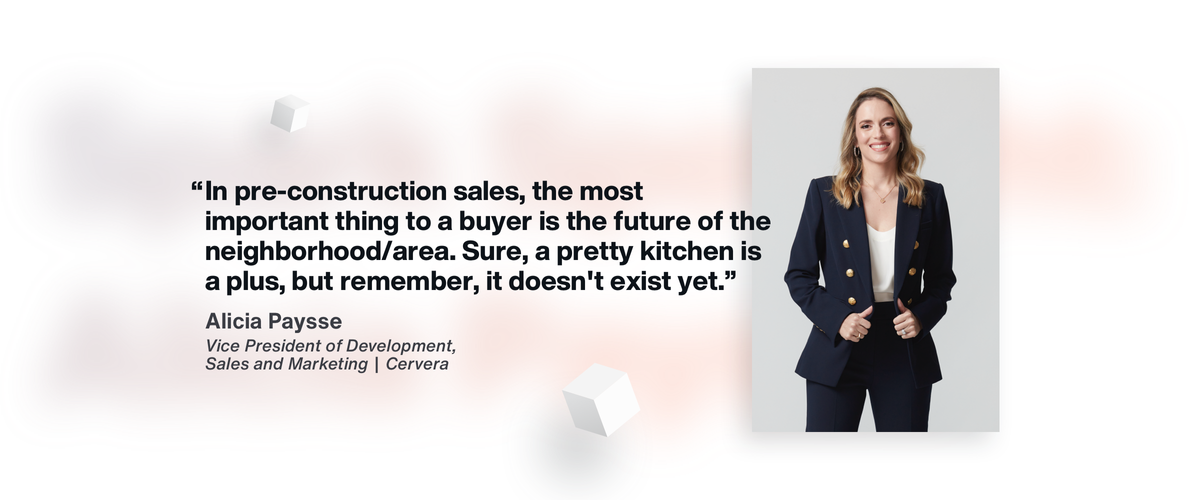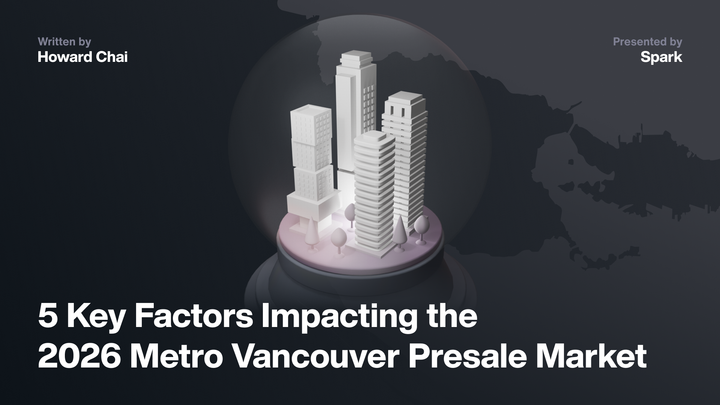Spark Spotlight: Alicia Paysse

Alicia Paysse, Vice President of Development, Sales & Marketing at Cervera, is the latest guest in our Spotlight Series. Beginning her career in the aftermath of the 2007 housing market crash, Alicia’s willingness to help those affected ultimately helped her climb the ranks to her current position as VP.
We sat down with Alicia to discuss her career journey, the nuances of New Development, and her most important consideration when selling presale homes.
Tell us a little bit about how you got to this point in your career.
I started on the sales floor, doing in-house sales for a project in 2009. I was fresh out of college and had just moved back to Miami. I had no idea where to start or how to succeed and my mother told me to just be the first one in, the last one out, and unless it's illegal, immoral or unethical, if someone asks you to do something, just say yes.
So I did that, and it worked. Having started in 2009, there were a lot of buyers who felt abandoned due to the fallout of the housing market crash. Everyone was very upset but that presented different opportunities.
A lot of unhappy people asked me to help them with tracking down their paperwork and I just did whatever was needed to help them out.
That very quickly turned into people coming back to me when they started having customers or when friends became interested in buying again. It's amazing that when you show up every day and try, eventually opportunities present themselves. From there things took off. 15 years later I’m now the Vice President of Development, Sales and Marketing for our firm, Cervera Real Estate.
Can you think of one pivotal decision that you think had the largest impact on the trajectory of your career?
I think choosing not to compromise between being a mother or my career had the biggest impact. When I had my first child, I chose to keep working. I actually only took four weeks of full maternity leave, which isn’t something that I would recommend for any new mom. After I started working part-time, four hours a day, I planned my work schedule around the nap schedule of my newborn. Finding the right help allowed me to keep working which was the most important thing because that allowed me to stay in the market and gain pivotal experience that really paid off in the future.
What three personality traits of yours do you think have contributed most to your career progression?
First, I have tremendous work ethic. I work very hard and a lot. Until now, I haven't found a substitute for putting in the time and because of this, I feel like the only way to succeed is to put in the effort.
Second, I think that I am thoughtful. I'm a big believer that things need to make sense. If they don't make sense to me, they're not going to make sense to those that work with or buy from us. Once I can make sense of things, it is easier for me to then transmit that to the people around me and get buy-in.
Finally, I'm very confident. Not in a way that’s “full of myself”, but I speak with confidence and know how to deliver a message with conviction, which is extremely important in my space.
I want to ask about your focus on educating brokers within the New Development industry. Are you able to tell us about some of the initiatives you've worked on and what outcomes you've seen so far?
So the New Development space is really different from the general real estate market. People don't have as much exposure to how things work in pre-construction. Before I became a mom, I was very involved with the Young Professionals Network, the board for the Miami Association of Realtors, which was focused on career growth. Having this unique background of a lot of exposure in pre-development, I offered to start teaching a class for the Miami Association about New Development sales and marketing.
Teaching the course made me realize that there was such a need for education on thai topic. Sometimes you don't even notice how many things other people don't get an opportunity to see. Other times people don't understand it fully until it's presented in a way that really illustrates it well for them. Since then, I've just kept up with it because people keep showing up. It’s really satisfying being able to teach something that people seem to get so much value from. It’s funny, because when I was younger I really wanted to be a teacher. I ended up studying construction management and real estate but I found myself teaching these courses, which just goes to show that God works in mysterious ways.
Follow up question, what do you think is the hardest thing for people to understand when moving from the general real estate market into New Development?
Everyone has different things that they would benefit from learning. If I had to say one thing, it would be positioning the unique value of the project. When you're selling a pre-construction condominium unit, you're selling a little box in the sky that does not exist. Unless you're selling at the very, very top of the market, most people that are buying that are betting on the future. People are buying something that doesn't exist yet because they perceive that it's going to be worth more in some capacity later than it is now. The clear message is that it doesn't matter how pretty the kitchens are if you can’t tell a compelling story about why the underlying area is going to be worth more, regardless of what the unit looks like. Talk a little bit about macroeconomic or microeconomic drivers, or investment that the city is making into the evolution of the neighborhood or private investment/projects under development. Whatever is happening that's going to make that place better. I think that that's something that's like an aha moment for a lot of people that are focused on the unit or the renderings. It’s more than that which ultimately pushes people over the edge.
Some parts of the real estate industry have been faster to adopt technology, while some firms have been slower. Is there one area within New Development where you've seen technology have a significant impact?
I think CRMs have had a massive impact because we're touching so many people with funnel automation, tracking website visits, and thresholds for when a lead is hot or cold. The evolution of how helpful some of these CRM programs are compared to how they were has been extreme.
When you first started in 2009, were you already using some early stage CRM tools or was that process more manual?
When I started, I was organizing my contacts for communication on the contacts app on my Mac computer. I created a bunch of contact groups in my Mac on my contacts and then would email people selectively. So I guess it's some type of hybrid, but I didn't have any real system. The emails would come out of my Mac mail application, and they were based on templates I previously made.
Now we have the ability to send communications directly from the platforms that are involved with the inventory management. As you guys know, at 72 Park Residences, we use the email blast module through Spark to send communications. We can see open rates and click throughs. Back in the day you used to have no idea.
Do you have any advice that you would give to somebody who has recently entered the industry?
I think that it's so important to listen to customers and understand what they're looking for so that you can solve a problem as opposed to implementing some suggestion that may be completely off base and make it unlikely you actually close them.



